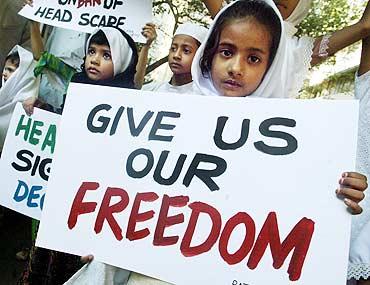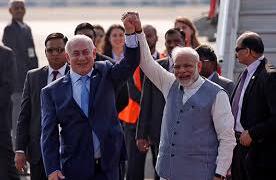 There is a news report today which talks of how Muslim women in India would like to break free of the shackles that society has placed on them. Honestly, it does not come as a surprise. It is perfectly understandable that Muslim women in India would like to lead normal lives, free from obsolescent controls and restrictions put on them in the name of religion. The role of women in India in general has completely changed in recent years as more and more women have become a part of productive workforce. They enjoy freedoms and decision making powers as never before. In light of these changes, it is depressing to note that a large section of women are being deliberately held back from realizing their potential in the name of anachronistic customs and traditions.
There is a news report today which talks of how Muslim women in India would like to break free of the shackles that society has placed on them. Honestly, it does not come as a surprise. It is perfectly understandable that Muslim women in India would like to lead normal lives, free from obsolescent controls and restrictions put on them in the name of religion. The role of women in India in general has completely changed in recent years as more and more women have become a part of productive workforce. They enjoy freedoms and decision making powers as never before. In light of these changes, it is depressing to note that a large section of women are being deliberately held back from realizing their potential in the name of anachronistic customs and traditions.
At the time when Islam came into existence, it was recognized as an exemplary religion in terms of the rights it bestowed upon women. Men and women were placed on an equal spiritual pedestal, Muslim women had inheritance rights, rights to choose their partner, right to divorce, right to maintenance and so on and so forth. These were revolutionary rights in an era when many societies did not differentiate between women and cattle. In fact, Prophet Muhammad’s first wife, Khadija was a successful woman who provided a lot of support to her husband during the initial period of turmoil in his life. Aisha, another of Prophet Muhammad’s wives, gave fiery speeches inciting men to war and even participated in battles herself. Islam, at that time, was viewed as a liberating religion, given the numerous rights and opportunities it provided to women.
Over a period of time, however, while the world moved on, an unholy alliance of vested interests and institutional fallacies have conspired to confine the role of Muslim women to as it was in the 7th century. A series of repressive laws, which made sense in the 7th century have continued and even been made more stringent with time. Polygamy, for instance, rampant in the ancient and medieval world has mostly disappeared from the world except in Islamic nations. Most countries today give equal rights to men and women, but that is not necessarily the case in many Islamic countries. Economically and socially, Muslim women continue to be deprived and treated as second class citizens. Institutional arrangements in many Islamic countries ensure that women suffer disproportionately as compared to men. On the whole, it is not a very happy picture when once looks at the rights of women in these countries.
Another unhealthy trend has been the re-emergence of regressive practices in many Islamic countries. Iran and Afghanistan used to be the epitome of ‘liberated Islamic countries’ in the 60s and 70s. The political turmoil that followed in both these nations has resulted in the triumph of orthodox forces that have made matters worse for women. Strict gender segregation has been introduced, Veiling has been made compulsory, testimony of women has become inadmissible in several cases, and even if admissible, is only worth a fraction of the testimony of a man. In countries such as Somalia, the Al-Shabab has been accused for raping women and then having them stoned to death. Countries such as Saudi Arabia, though economic powerhouses, continues to deny women the right to drive, or even travel outside, unaccompanied by known men, or even step out of their houses without being enveloped in the stifling black burqa that covers them from head to toe. The emergence of IS in many areas of Middle East and North Africa has meant further deterioration of the rights of women. Girls as young as 7-8 years are married off to IS fighters or worse still sold as slaves. The entire recent history of women in these regions is an unending saga of misery, enslavement and despondency.
Women’s right was an important issue that came up before our lawmakers in the years following our independence. Through a set of legislations, undoubtedly bitterly contested, our lawmakers revised laws pertaining to the rights of Hindu women. Rights pertaining to matters such as divorce, inheritance and succession were introduced. There was an upheaval because Indian religions typically consider marriage as a sacrosanct institution and not a mere contract and yet these reforms were pushed through. Undoubtedly, they have helped re-invigorate women and strengthen their rights. Unfortunately, our lawmakers have been more orthodox when it comes to giving similar rights to Muslim women. It is unbelievable that an Indian Muslim woman in 2015 can be divorced by her husband by merely uttering Talaq thrice, that she can be married to a man who is already married, that she is subject to Fatwas on various matters that can be issued by a Moulvi from time to time. Does this make any sense at all in today’s time? Socially, it creates a ghetto of population that is mired in regressive practices, at odds with the population outside. Economically, it creates a pool that is low in productivity and subject to economic exploitation. Judicially, it creates a class of people who do not enjoy the liberating freedoms enshrined in our constitution.
The issue of reforming Muslim Personal Law is a politically loaded one. Secularists of all hues and colours decry any attempt at what they perceive is an interference in practice of a minority religion. But is this protest justified? Are we to keep a section of the population perpetually oppressed by ancient laws that have no relevance whatsoever in the present times, only because religion says so? Or should we strive, pro-actively to educate their leaders to shun wrong practices, accept the realities of the modern world and make amendments to bring their communities in line with the nation? The answer is not very difficult but the underlying politics will probably make it impossible to attempt.
It is time to move beyond the Fatwas and give Muslim women the rights they deserve- As free-thinking, liberated and empowered Indians!





























“Woman is an embodiment of the worst desires, hatred, deceit, jealousy and bad character. Women should never be given freedom. Killing of a woman, a Shudra or an atheist is not sinful. (Manu IX. 17 and V. 47, 147)” From the Manusmriti, which the RSS wanted instead of the constitution. “Long before Gandhi came to be hated as an appeaser of Muslims, he was already despised for cleaning his own toilet and breaking Manu’s code against pollution by upper castes. Sardar Vallabhai Patel, of whom Narendra Modi has promised to build the world’s tallest statue, had this to say: “All the [RSS] leaders’ speeches were full of communal poison. As a final result of the poison…an atmosphere was created in which such a ghastly tragedy became possible…RSS men expressed joy and distributed sweets after Gandhiji’s death.” (Excerpts from Sardar Patel’s letters to MS Golwalkar and SP Mookerjee.)
http://scroll.in/article/689584/how-the-sangh-parivar-systematically-attacks-the-very-idea-of-india
First tell the above article is correct or not.
Do you justify muslim women getting their human rights or not.
Then talk abt some thing else.
No Im Not justifying oppression of woman in any religion. Period.
Neither the double standards of anyone accusing the other religion to be unfair by overlooking his own.
Because in religion we rot, whichever it may be.
That’s exactly the author’s point. Other religions have moved beyond certain practices mentioned in their scriptures which might have been relevant in the times they were written. But certain religions have not moved on yet.